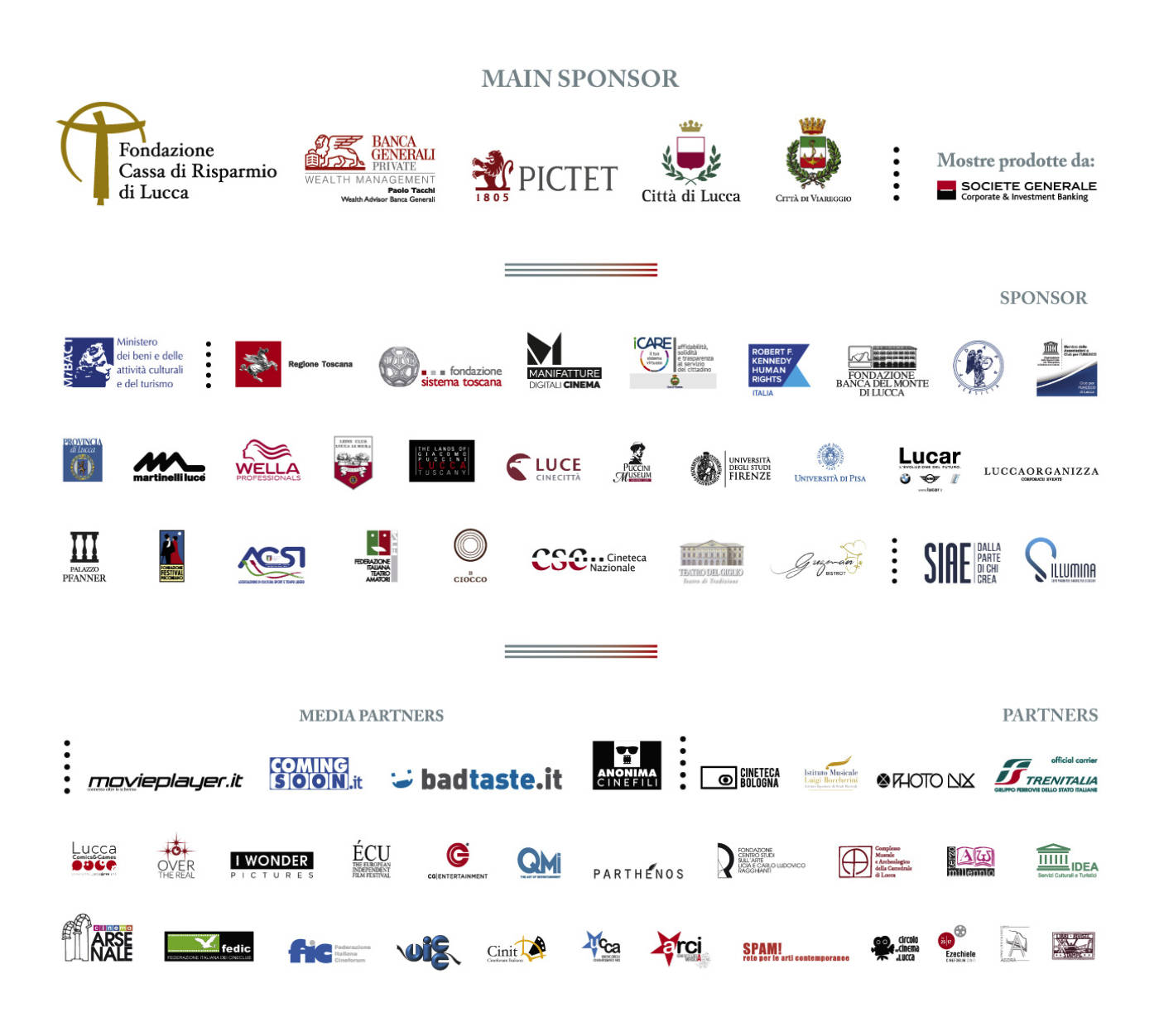Lucca Film Festival and Palazzo Pfanner
present
MARCELLO L’ANTIDIVO DI SUCCESSO
curated by Alessandro Orsucci
From 21 september to 27 october 2024
Palazzo Pfanner – Lucca (directions)
Opening on Saturday, September 21 at 6:00 PM
On Saturday, September 21, the exhibition “MARCELLO L’ANTIDIVO DI SUCCESSO”, curated by Alessandro Orsucci, opens to the public at Palazzo Pfanner in Lucca. The exhibition is held on the occasion of the Lucca Film Festival, scheduled from September 21 to September 29, 2024.
The exhibition is a tribute to one of the most famous Italian actors in the world, Marcello Mastroianni, whose 100th birthday is celebrated this year (September 28, 1924). He was an extraordinary performer in some of Federico Fellini’s masterpieces such as La dolce vita and 8 ½, the first two films made together that changed the history of cinema and made Marcello an international star. Son of artisans, he was a shy, kind, and simple man, little inclined to stardom, “a successful anti-star.” His natural beauty and charm captivated the female audience, although he hated being considered a “Latin lover.” He is the most awarded Italian actor ever, with a career spanning over fifty years, initially shaped in theater. He took part in more than 140 films, displaying great versatility in playing diverse roles, and worked with the best directors, including De Sica, Visconti, Monicelli, Germi, Risi, Scola, Antonioni, and finally Fellini, who made him immortal and with whom he had a deep friendship. “Of Marcello the actor,” Fellini said in an interview, “the quality I appreciate most is his total trust in whoever directs him.” “He’s the easiest director to work with,” Mastroianni would say of Fellini, “with him it’s really like play.”
“I like to remember Mastroianni with a definition by Claudio G. Fava: the willing talent of an ‘involuntary handsome man,’” explains the curator Alessandro Orsucci. “The exhibition offers an exploration of the films, genres, and extraordinary collaborations of the actor, based on research into his filmography that allowed me to select works by considering the importance of the film and especially Marcello’s work with others. I would like to remember not only the most important films but also focus on those he collaborated with — directors, composers, actors, and actresses — who, together with his natural talent, contributed to making the History of Italian and world cinema. I thank the Lucca Film Festival, my friend and director Nicola Borrelli, and the Pfanner family, who over the years have shown sensitivity and been pleased to host my exhibitions in the enchanting historic palace in Lucca.”
The actor also had a special connection with Lucca; his beloved country house was located in the Lucchesi hills in Pescaglia, a 17th-century farmhouse bought in the 1970s, where he spent much of his free time with his family and the greatest names in cinema who came to visit him.
MARCELLO L’ANTIDIVO DI SUCCESSO, through Mastroianni’s life and career, documents almost 60 years of our country’s history, from Neorealism to Italian comedy. It features original posters, billboards, film sketches, and drafts that were part of the advertising material from the film releases, all from Alessandro Orsucci’s vast collection. Central to this exhibition is also film music, with a unique display of original soundtracks on vinyl, composed by masters such as Nino Rota, Carlo Rustichelli, Armando Trovajoli, and Ennio Morricone, to name a few, accompanied by original record covers, which were often designed, along with books and music scores. The journey starts in the 1950s with the first ‘beach’ film Una domenica d’agosto, directed by Luciano Emmer, where a debuting Mastroianni was dubbed by Alberto Sordi. Following this, both in 1954, are Cronache di poveri amanti, directed by Carlo Lizzani and based on Vasco Pratolini’s novel, which was awarded at the Cannes Film Festival, and Peccato che sia una canaglia, directed by Alessandro Blasetti, where Marcello acted alongside Loren and Vittorio De Sica. In 1957, he starred in Le notti bianche by Luchino Visconti, who had met him in 1948 and directed him in numerous theater performances. Thanks to this film, Marcello received the Silver Ribbon as best leading actor. The journey continues with I soliti ignoti by Mario Monicelli, a masterpiece of Italian comedy with an exceptional cast including Totò, Claudia Cardinale, Vittorio Gassman, and Renato Salvatori.
The 1960s open with Il bell’Antonio, directed by Mauro Bolognini, again alongside Claudia Cardinale, and the iconic La dolce vita, which marked the beginning of his partnership with Federico Fellini, as also highlighted by the posters and promotional materials for 8 ½ (1963), La città delle donne (1980), and Ginger and Fred (1986). Three other memorable films came out in 1961: Fantasmi a Roma by Antonio Pietrangeli, a delightful comedy that gathered the best of Italian cinema and theater, featuring Mastroianni, Eduardo De Filippo, Vittorio Gassman, and Sandra Milo; La notte by Michelangelo Antonioni with Monica Vitti and Jeanne Moreau, one of the most significant films of those years, which won the Golden Bear at the Berlin Film Festival, three Silver Ribbons, and the David di Donatello for Best Director; and finally, Divorzio all’italiana by Pietro Germi, an international success that won the Oscar for Best Screenplay. Of the eight films made under the direction of Vittorio De Sica, the exhibition focuses on the two co-starring Sophia Loren, Ieri, oggi, domani (1963) and Matrimonio all’italiana (1964), which conquered cinemas worldwide.
Moving into the 1970s, the collaboration with director Ettore Scola is remembered with two great successes: Dramma della gelosia (tutti i particolari in cronaca) (1970), starring alongside the great Monica Vitti and Giancarlo Giannini, and Una giornata particolare (1977) with the masterful Sophia Loren. In 1973, he starred alongside three other notable actors of Italian and French cinema — Ugo Tognazzi, Michel Piccoli, and Philippe Noiret — in La grande abbuffata, a work considered scandalous and irreverent at the time, directed by Marco Ferreri. This string of continuous awards and recognitions continues up to the years preceding Mastroianni’s death in 1996, with Stanno tutti bene, directed by Giuseppe Tornatore (1990), accompanied by a splendid soundtrack by Ennio Morricone, and finally Sostiene Pereira (1995) by Roberto Faenza, based on the novel by Antonio Tabucchi, featuring Mastroianni’s unforgettable final performance.
The exhibition also includes a section dedicated to Sophia Loren, with whom Marcello starred in 14 films. The first comedy that brought them together on set was Cuori sul mare, where Loren, just 16 years old and still bearing her birth name Scicolone, had only a small role. Friends and accomplices on screen, they were an explosive pair, the golden couple of Italian cinema, who knew how to portray love in its many forms. Together, they helped write part of their legend.
Info Exhibition
MARCELLO L’ANTIDIVO DI SUCCESSO
curated by Alessandro Orsucci
21 september – 27 october 2024
Palazzo Pfanner, Lucca
Via degli Asili 33 – 55100 Lucca (map)
Opening hours:
every day from 10am to 6pm
Ticket (included in the visit to the residence):
full 4.5€ | reduced 4€ (children 12-16 / students / adults > 65) | groups (>10) 4€
Lucca Film Festival
The Lucca Film Festival has honored international cinema greats such as Oliver Stone, David Lynch, Susan Sarandon, Isabelle Huppert, Rutger Hauer, George Romero, Paolo Sorrentino, and Willem Dafoe. It is a highlight of Tuscany’s cultural scene, made possible with the support of the Fondazione Cassa di Risparmio di Lucca, the Municipality of Lucca, Vivi Lucca Events, Lands of Giacomo Puccini, and the Chamber of Commerce of North-West Tuscany. Main sponsors include Banca Generali Private Wealth Management (Paolo Tacchi) and Banca Pictet.
The event is part of the National Cinema and School Images Plan promoted by MiC and MIM, and is supported by the Ministry of Culture – Directorate General for Cinema and Audiovisual, the Tuscany Region, Fondazione Sistema Toscana, Manifatture Digitali Cinema, Sofidel, Fondazione Banca del Monte di Lucca, Fondazione Giacomo Puccini and Puccini Museum – Casa Natale, Audi Center Terigi, Tenuta del Buonamico, Martinelli Luce, Naturanda, and Futuro3D. Collaborators include SIAE – Italian Society of Authors and Publishers, Tecno Servizi, Ristorante Giglio, Palazzo Pfanner, Over The Real, Teatro del Giglio di Lucca, IMT School for Advanced Studies Lucca, Academy of Fine Arts of Carrara, Augusto Passaglia Artistic, Musical, and Coreutico High School, N. Machiavelli Classical High School, and ISIS Pertini, Associazione 50&PIÙ, ACLI Lucca.
Special thanks to ANSA, Rai Toscana, Rai Radio 3, Movieplayer.it, Film4Life, Festival Scope, A.C.S.I. – Italian Sports Centers Association, Italian Federation of Amateur Theater (FITA), Trenitalia, Fic Uicc, Cinit Ucca Arci, Fedic, Corte Tripoli, Lucca Film Club, Cineforum Ezechiele 25:17, Cinema Centrale Astra and Moderno Cinema, Cinema Arsenale, University of Pisa, University of Florence, Fondazione Carlo Ludovico Ragghianti, Pisa al Cinema, Cineteca Bologna, National Film Archive, Luigi Boccherini Music Institute, Robert F. Kennedy Human Rights Italia, Donne all’Ultimo Grido Association, SPAM! Network for Contemporary Arts, Lucca Comics & Games, Photolux Festival, and Lucca Classical Music Festival.
Contatti
Lucca Film Festival
segreteria@luccafilmfestival.it | www.luccafilmfestival.it
Press office Lucca Film Festival: Reggi&Spizzichino Communication
Tel. +39 06 20880037 | Maya Reggi +39 347 6879999 | Raffaella Spizzichino +39 338 8800199 | Carlo Dutto +39 348 0646089
info@reggiespizzichino.com | www.reggiespizzichino.com
Press Office LFF Exhibitions: Davis & Co. Lea Codognato e Caterina Briganti
Tel. +39 055 2347273 | info@davisandco.it | www.davisandco.it
Communication and External Relations Cassa di Risparmio di Lucca Foundation: Andrea Salani
Tel. +39 0583 472627 | comunicazione@fondazionecarilucca.it



